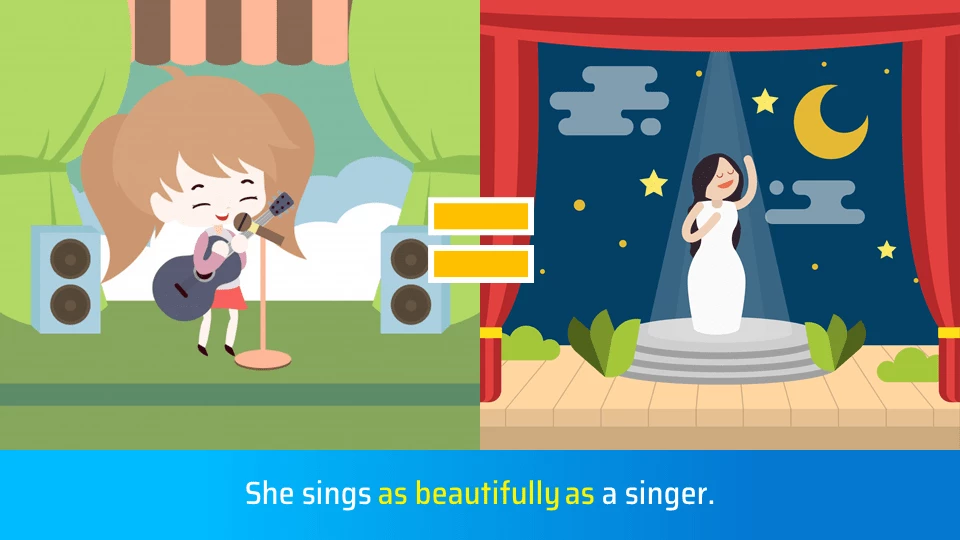Forms of comparison in English
The comparative structure in English is used very commonly in communication as well as writing. However, there are still quite a few people who confuse the comparative forms in English, leading to using the wrong words or incorrectly expressing what they want to express. In this article, EnglishTopVN will help you consolidate all of this knowledge in a simple and concise way so you can apply it most accurately.
1. Concepts
In Vietnamese, we can compare one thing with another in the following three ways:
-
Compare with: This pen equal length that pen.
-
Comparative: This pen longer that pen.
-
Superlative: This pen longest.
In English there are also 3 ways to make such comparisons. Let's learn about comparative forms in English in this lesson.
Note:
-
In English, only adjectives and adverbs have comparative forms. All other types of words do not have a comparative form.
- In the formulas below, adjectives are denoted as ADJ, adverbs are denoted as ADV.
2. Compare equals
|
Summary:
|

Comparison of equality is when we compare one thing to another, one thing to another.
Recipe: as + ADJ/ADV + as or so + ADJ/ADV + as (less used)
For example:
-
Lan is 18 years old. My younger sister is also 18 years old. Lan is as young as my younger sister.
-
She sings as beautifully as a singer.
After equal comparison there can be 2 cases
-
Say the complete subject and verb:
She sings as beautifully as a singer does. → after comparison with subject and predicate: a singer does.
-
Abbreviate the verb:
She sings as beautifully as a singer. → after comparing equals is a noun: a singer.
⇒ The two sentences above only differ in grammar but are completely similar in meaning.
3. Comparative
|
Summary:
|

- Comparative more is when we compare one thing over another, for example better, nicer, more beautiful.
Recipe:
-
If the word has only 1 syllable: ADJ/ADV + ending -er + than
-
If the word has 2 or more syllables: more + ADJ/ADV + than
-
Special case:
-
-
Two-syllable adjective but ending in -er, -le, -ow, -et is considered a short adjective.
-
Adjectives and adverbs have two syllables that end in -y then transfer -y wall -i then add the tail -is or - East.
-
However, two-syllable adverbs that end in -ly, we need to use the structure more or most.
-
-
-
With short adjectives, if the word-final consonant is preceded by a vowel, then we double the word-final consonant.
-
For emphasis in a comparative structure, use much, a lot, far,...
-
For example:
-
Nam is taller than me.
→ tall is a short adjective so the comparative form is taller.
-
This problem is more difficult than that one.
→ difficult is a long adjective so the comparative form is more difficult.
-
He worked harder than the others.
→ hard is a short adverb so the comparative form is harder.
-
My father drives more carefully than I do.
→ "carefully" is a long adverb so the comparative form is more carefully.
Or than There can be 2 cases:
- Say the complete subject and verb:
Nam is taller than I have them. → or than has subject and predicate: I am.
- Abbreviate the verb:
Nam is taller than me. → or than To be: me.
⇒ The two sentences above only differ in grammar but are completely similar in meaning.
If the sentence doesn't contain "than" then we are comparing to something that is implicit.
For example:
- Ben is tall but Matt is even taller.
-
Her cooking skills have become much better.
- Compare less
We can replace more equal less to compare less. However, native speakers often do not use this comparison of less than, but use the comparative structure of equality or the opposite comparison.
For example:
- Question A is more difficult than question B.
We can compare less, but it doesn't sound very natural:
- Question B is less difficult than question A.
We can express it in two other ways of comparison:
- Compare with: Question B is not as difficult as question A.
- Comparative and opposite: Question B is easier than question A.
4. Superlative
|
Summary:
|

Superlatives are when we compare something as superior to all others, for example best, best, most beautiful.
Recipe:
-
If the word has only 1 syllable: the + ADJ/ADV + -est
-
If the word has 2 or more syllables: the + most + ADJ/ADV
-
Special case:
For example:
-
Nam is the tallest student in his class.
→ tall is a short adjective so the superlative form is the tallest.
-
This is the most difficult problem in the book.
→ difficult is a long adjective so the superlative form is the most difficult.
-
Who jumps the highest will win.
→ high is a short adverb so the comparative form is the highest.
-
He drives the most carelessly.
→ carelessly is a long adverb so the superlative form is the most carelessly.
As for the superlative case of an adjective modifying a noun, we can also use a possessive adjective (my, your, his, their...) instead of articles the.
-
John is the youngest son.
-
John is my youngest son.
5. Note about comparatives and superlatives
|
Summary:
|
- Special cases:
- With long two-syllable adjectives but ending in -er, -le, -ow, -et, we consider it as a short adjective:
- clever → cleverer → the cleverest
- simple → simpler → the simplest
- narrow → narrower → the narrowest
- quiet → quieter → the quietest
- With two-syllable adjectives and adverbs that ending in -y, we change -y to -i and then add -er or -est:
-
dirty → dirtier → the dirtiest
-
easy → easier → the easiest
-
happy → happier → the happiest
-
pretty → prettier → the prettiest
-
early → earlier → the earliest
-
- However, adverbs have two syllables that ending in -ly, we need to use the structure "more" or "most":
-
quickly → more quickly → the most quickly
-
likely → more likely → the most likely
-
- With short adjectives, If the word-final consonant is preceded by a vowel, then we double the word-final consonant:
- big → bigger → biggest
- sad → sadder → saddest
- When needed Emphasize an adjective in a comparative structure, we use one of the following words: much, a lot, far,...
-
The song today is much better than that one from yesterday.
Today's song much better compared to yesterday's post.
-
Alex is far shorter than his brother.
Alex Much lower compared to brother.
-
-
When needed Emphasize an adjective in a superlative structure, we use one of the following words: very,...
-
Our company implements the very latest agricultural techniques.
Our company applies agricultural technology most modern.
-
- Some irregular adjectives and adverbs:
In English, there are some adjectives and adverbs that have comparative and superlative forms that are different from the usual structure, so you need to memorize these cases.
But fortunately, these words are quite few and at the same time very common words in English, so you will encounter them often and will automatically remember them!
|
Compare more |
Superlative | |
|
good |
better |
the best |
|
well |
better |
the best |
|
bad |
worse |
the worst |
|
badly |
worse |
the worst |
|
many |
more |
the most |
|
much |
more |
the most |
|
little |
less |
the least |
|
far |
farther (literally) further (figuratively) |
the farthest (literal meaning) the furthest (figurative) |
6. Compare nouns
|
Summary: The essence of noun "comparative" constructions is comparison of many and much:
|
In some documents, you can learn about "comparing" nouns, specifically as follows.
- More comparative:
- We have more homework than other students.
- Superlative:
- They earned the most points and therefore won the contest.
- Compare with:
- We didn’t spend as much time at the museum as I had hoped.
However, the nature of these noun "comparison" structures is still comparison of many or much never mind.
- We have more homework than other students. → comparative of much
- They earned the most points and therefore won the contest. → superlative of many
- We didn’t spend as much time at the museum as I had hoped. → compare equals of much

